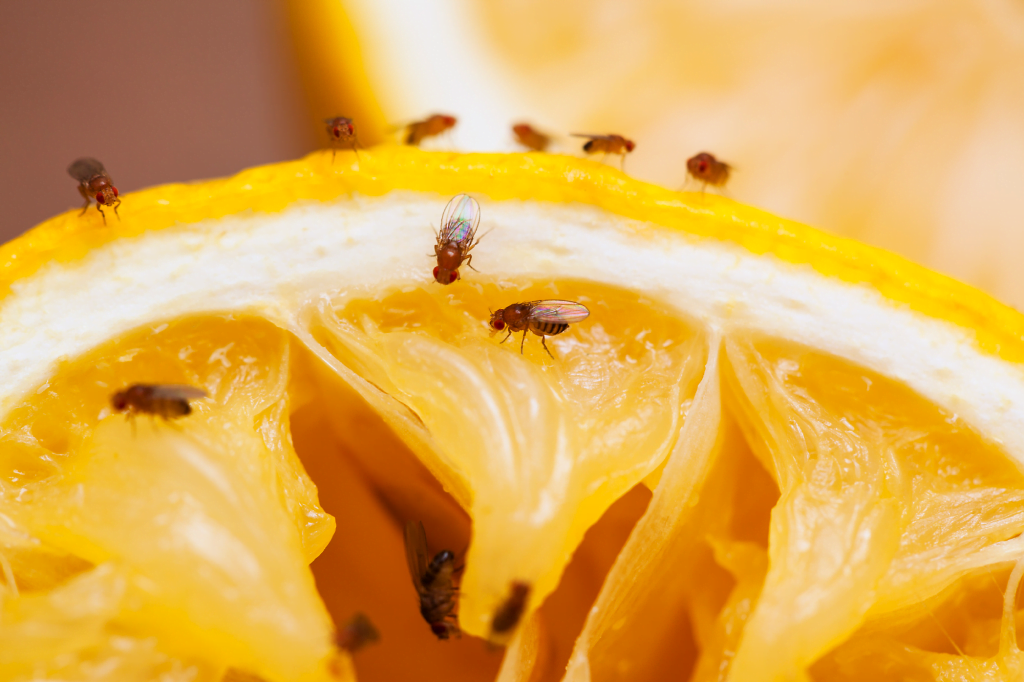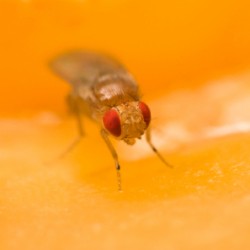The tiny buzzing sound of a fly in your kitchen is enough to send anyone into a frenzy, especially when they’re fruit flies. And those tiny black specks jumping in your carpet? Flea infestations are no picnic either. These small creatures, though seemingly insignificant, can cause big problems, ranging from annoyance to serious health issues. For those facing infestations, pinpointing the culprit can be a source of confusion. Are you dealing with fruit flies or fleas? This article will help you understand the differences between these pesky creatures.

Image: healthchanging.com
Even though they are tiny, fruit flies and fleas are distinct in their appearance, habits, and impact on humans. This detailed comparison will equip you with the necessary knowledge to identify these pests accurately and effectively deal with them.
Understanding the Differences: Fruit Flies vs. Fleas
Fruit flies (Drosophila melanogaster) and fleas (order Siphonaptera) are both tiny insects that can invade homes, but they are vastly different creatures with distinct characteristics.
Fruit Flies: The Kitchen Invaders
Fruit flies, also known as vinegar flies, are small, winged insects with a characteristic reddish-brown body. They are attracted to ripe or fermenting fruits and vegetables, which they use as a source of food and breeding grounds.
Fruit flies typically live for about 30 days, but they are very prolific breeders. A female fruit fly can lay up to 500 eggs during her lifetime, with a new generation emerging every 7-10 days in ideal conditions. This rapid reproduction makes fruit fly infestations a common problem in homes and restaurants. They are not known to bite or spread disease, but their presence can be incredibly annoying!
Fleas: The Bloodsucking Parasites
Fleas are wingless, flat insects that are dark brown or black and are very good at jumping. They are parasitic insects, meaning they feed on the blood of their hosts, which can include mammals and birds.
Fleas are primarily known for their ability to jump incredible distances, up to 100 times their body length. This allows them to quickly move from one host to another. Fleas are responsible for transmitting various diseases, including plague, typhus, and tapeworms. They bite humans and pets, causing itchy welts and allergic reactions. Besides the health risks, flea infestations can be stressful for both humans and pets, creating an unsuitable environment for everyone.

Image: www.thriftyfun.com
Telling Them Apart: Key Differences
Identifying whether you’re dealing with fruit flies or fleas is crucial for taking appropriate measures to control their population. Here’s a helpful breakdown of key differences that can aid in their identification:
Appearance
- Fruit flies have wings and are quite small, typically 1/8 inch or less in length. They are usually a reddish-brown color.
- Fleas are wingless and have a characteristic flat, oval-shaped body. They are usually darker brown or black and are significantly smaller than fruit flies, only about 1/16 inch long.
Location
- Fruit flies are typically found in areas where food is present, such as kitchens, pantries, and garbage areas.
- Fleas are found wherever their hosts are, including pets, carpets, bedding, and furniture.
Behavior
- Fruit flies are attracted to overripe fruits and vegetables and are usually seen buzzing around these items or near garbage containers.
- Fleas are known for their jumping abilities and are often observed jumping between hosts or on carpets and furniture.
Bites
- Fruit flies do not bite humans.
- Fleas bite humans and pets, leaving behind itchy welts that can lead to allergic reactions.
Control and Prevention: A Comprehensive Guide
Once you’ve identified the pest in your home, it’s time to make a plan to get rid of them. The approaches for dealing with fruit flies and fleas differ due to their distinct habits and lifecycles.
Fruit Fly Control
- Cleanliness: Fruit flies are attracted to food sources and moisture. The first step in controlling a fruit fly infestation is to clean up any messes related to food. Wash dishes promptly, wipe down counters, and dispose of overripe fruits and vegetables immediately.
- Store food properly: Store fruits and vegetables in airtight containers to prevent fruit flies from accessing them and lay eggs.
- Garbage control: Empty garbage bins frequently and keep them sealed tightly to prevent fruit flies from breeding in the trash.
- Traps: Numerous homemade and commercially available traps can lure fruit flies and eliminate them effectively. Apple cider vinegar traps and sticky traps are proven methods.
Flea Control
- Vacuuming and cleaning: Regularly vacuuming carpets, furniture, and pet bedding helps to remove fleas and their eggs. Washing bedding regularly in hot water is also crucial.
- Pet treatment: Treating pets with flea medications, such as spot-on treatments, oral medications, or shampoos, is essential for controlling flea infestations. Consult your veterinarian for the best treatment options for your pet.
- Professional pest control: In case of severe infestations or difficulty in controlling fleas, it’s recommended to contact a professional pest control service. They can assess the situation and apply appropriate treatments for your home.
- Prevention: Regularly vacuuming, washing, and treating pets can go a long way in preventing flea infestations. Additionally, avoiding areas with potential flea exposure, like wooded areas where animals are present, helps minimize the risk of bringing fleas into your home.
Expert Advice: Tips for Effective Pest Control
Having dealt with both fruit flies and fleas myself, I’ve learned that prevention is always the best strategy. Keeping your home clean and storing food properly will help prevent fruit flies, while regular pet care reduces the risk of fleas. However, if you find yourself facing either infestation, it is important to act quickly before the problem escalates. Here are some key tips for effective pest control:
For fruit flies, a combination of proper sanitation and traps often proves to be the most effective solution. Always address the root of the problem by cleaning up food debris and ensuring proper food storage. Utilize traps to eliminate any lingering flies. For fleas, a comprehensive approach is essential, including treating pets and thoroughly cleaning your home. Remember, don’t stop at vacuuming alone; wash bedding in hot water and consider steam cleaning carpets. If you’re experiencing a major infestation or finding it challenging to control the pests, don’t hesitate to contact a professional pest control service.
Frequently Asked Questions
Q: What is the best way to get rid of fruit flies?
A: The best way to get rid of fruit flies is to address the root of the problem, which involves cleaning up any food sources, storing food properly, and disposing of garbage properly. In addition, using homemade or commercially available traps can help eliminate remaining flies.
Q: What are some signs of a flea infestation?
A: Signs of a flea infestation include tiny black specks on carpets and furniture, itchy bites on humans and pets, and seeing fleas jump or move quickly on the floor.
Q: What can I do to prevent future fruit fly infestations?
A: To prevent future fruit fly infestations, maintain a clean kitchen by wiping down counters and sinks, washing dishes regularly, and disposing of garbage promptly. Store food properly in airtight containers. And keep ripe fruits and vegetables in the refrigerator.
Q: Can fleas live on furniture and carpet?
A: Fleas can live on furniture, carpets, and bedding. They can also lay eggs in these areas, which hatch into larvae that feed on organic debris and eventually develop into adult fleas.
Fruit Fly Or Flea
Conclusion
Understanding the differences between fruit flies and fleas is crucial for effective control. While both these pests can be annoying and cause problems in homes, they require different approaches to address them. Remember the key differences in appearance, location, behavior, and bites to accurately identify the pest. With proper hygiene, storage, and control measures, you can effectively eliminate and prevent these pesky creatures from invading your home.
Are you interested in learning more about specific fruit fly or flea control methods? Let us know in the comments below!






